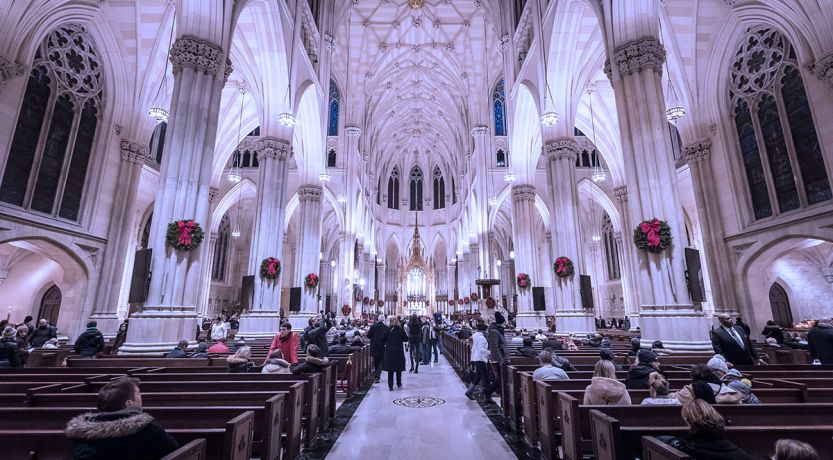People around the world celebrate Jesus’ birth on Dec. 25. However, this date held no particular significance to Jesus Himself. But other days did.
For millions of Christians around the world, the only time of the year they go to church is Christmas and Easter. These are sometimes called CEOs (Christmas and Easter Only attendees).
According to the Hartford Institute for Religion Research, only 20 percent of American Christians actually attend church on a weekly basis. (The number is even lower in Europe.) Many churches report that their attendance nearly doubles on Christmas, and there is a significant spike in Google searches for “church” in late December.
Why do people who normally don’t go to church show up on Christmas?
Well, only those people can really answer that, but it’s likely because they see it as a special celebration of Christ’s birth, so they want to do what they believe honors Him.
But consider this question: Does Christmas hold the same significance to Jesus Himself?
Missing from the Bible
To answer any question about Jesus Christ, our first (and really only) logical source is the Bible—particularly the four Gospels and the later writings of His contemporaries. When you study those documents, it’s striking that the most prominent celebration associated with Christianity is totally absent. Nobody—not Jesus, not Peter, not John, not Paul—gives any hint that he had ever celebrated Jesus’ birth in December (or any month).
Some people believe it is okay to celebrate holidays originally rooted in paganism because they have now been Christianized. But is God okay with this?
That is not to say that the Bible doesn’t talk about Jesus’ birth, but it actually gives very few details about it. It is only covered in the Gospels of Matthew and Luke (Mark and John never discuss it). But if you read Matthew 1-2 and Luke 2 closely, you discover there are only a few verses that directly discuss the actual day of His birth (Matthew 1:25; Luke 2:7-16). The rest of these sections describe events that surrounded His birth, but did not actually occur on the same day.
What is typically called “the Christmas story” inaccurately squeezes almost all the events described in Matthew 2 and Luke 2 into one single day in late December.
For instance, the common perception is that three wise men visited the infant Jesus on the night of His birth. But the wise men actually didn’t arrive until much later, when the family was living in a house and Jesus was no longer a newborn (Matthew 2:11). And the Bible doesn’t say there were three wise men (verse 1). To learn more about the myths surrounding His birth, read “The Birth of Jesus: Myths and Misperceptions.”
What did Jesus celebrate?
But if Jesus didn’t celebrate the most popular religious holidays of today, did He celebrate anything? Yes. In fact, the New Testament provides a lot of details about the religious days He observed.
Throughout His life, Jesus faithfully observed the Sabbath on the seventh day of the week. It was such a regular part of His life that Luke described it as “His custom” (Luke 4:16). No matter where He was, from Jerusalem to Galilee, He always rested and would attend the synagogue to hear and read the Scriptures and sometimes teach (verses 17-21).
Jesus grew up in a family that faithfully observed the biblical holy days rooted in the Old Testament scriptures (Leviticus 23). For example, Luke records that His family “went to Jerusalem every year at the Feast of the Passover” (Luke 2:41).
Every year.
This wasn’t just to keep the feast known as the Passover. It included the two holy days that fall in a week’s time—the first and seventh days of the Feast of Unleavened Bread (verse 43; see also Leviticus 23:4-8). He also observed the other festivals taught in Leviticus 23. John 7, for example, provides an account of the last Feast of Tabernacles Jesus kept as a human being.
The early Church continued to follow His example by observing these special days. Our online article “Christian Festivals” highlights many scriptures that show the early Christians observed the same days Jesus did.
Follow Christ
One of Discern’s primary purposes is to help our readers discover Bible truths that are not widely understood or practiced. That’s why we write about the biblical holy days so often. These days were established by God and were a major part of Jesus’ life when He walked the earth. Yet most mainstream Christians ignore these biblically sanctioned days and instead keep unbiblical holidays like Christmas—which are man-made and based on ancient pagan worship. Consider that Christmas was first mentioned in A.D. 336—more than 300 years after Christ’s lifetime!
Some people believe it is okay to celebrate holidays originally rooted in paganism because they have now been Christianized. But is God okay with this? The truth is, God has never given people permission to appropriate paganism and redefine it as worshipping Him. In fact, He commanded in no uncertain terms that they never do that (Deuteronomy 12:29-31; Jeremiah 10:1-5; 2 Corinthians 6:17).
One of the apostle Paul’s most succinct and memorable lines is found in 1 Corinthians 11:1: “Imitate me, just as I also imitate Christ.”
In this short sentence, Paul captures the essence of what real Christianity is. When it comes to how you worship God, will you imitate the example of Jesus by observing the biblical festivals He observed? Or will you celebrate holidays invented by men?
To learn more about the problems with Christmas, read a past Christ vs. Christianity article “Jesus Christ vs. Christmas.”
Sidebar: Is Christmas Christian? Four Questions to Consider
Most assume Christmas is a Christian holiday, even though it has been secularized and is celebrated by millions of non-Christians. Here are four questions to consider about Christmas. The answers may lead you to reconsider giving this holiday a “Christian” label.
- Is it Christian to celebrate Christ’s birth on the birthday of an ancient sun god?
- Is it Christian to keep ancient pagan worship practices alive by calling them Christian?
- Is it Christian to lie to children about a mythical figure’s existence?
- Is it Christian to ignore the festivals sanctioned in the Bible and instead keep holidays taught nowhere in the Bible?
These questions are addressed in our InSights blog post “Four Reasons Christmas Is Not Christian.”






